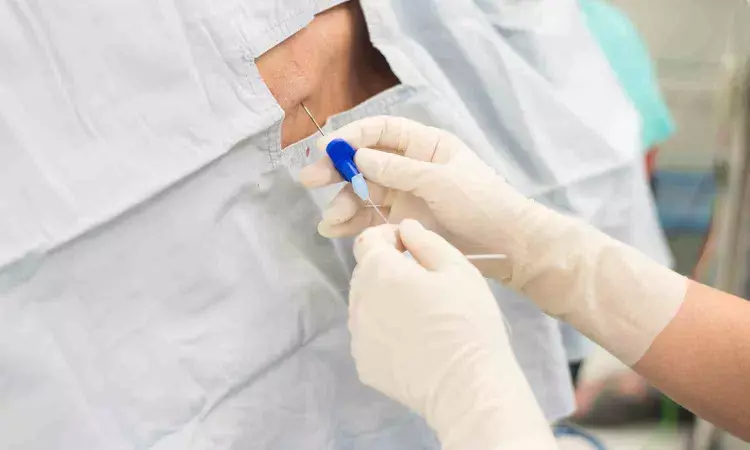- Home
- Medical news & Guidelines
- Anesthesiology
- Cardiology and CTVS
- Critical Care
- Dentistry
- Dermatology
- Diabetes and Endocrinology
- ENT
- Gastroenterology
- Medicine
- Nephrology
- Neurology
- Obstretics-Gynaecology
- Oncology
- Ophthalmology
- Orthopaedics
- Pediatrics-Neonatology
- Psychiatry
- Pulmonology
- Radiology
- Surgery
- Urology
- Laboratory Medicine
- Diet
- Nursing
- Paramedical
- Physiotherapy
- Health news
- Fact Check
- Bone Health Fact Check
- Brain Health Fact Check
- Cancer Related Fact Check
- Child Care Fact Check
- Dental and oral health fact check
- Diabetes and metabolic health fact check
- Diet and Nutrition Fact Check
- Eye and ENT Care Fact Check
- Fitness fact check
- Gut health fact check
- Heart health fact check
- Kidney health fact check
- Medical education fact check
- Men's health fact check
- Respiratory fact check
- Skin and hair care fact check
- Vaccine and Immunization fact check
- Women's health fact check
- AYUSH
- State News
- Andaman and Nicobar Islands
- Andhra Pradesh
- Arunachal Pradesh
- Assam
- Bihar
- Chandigarh
- Chattisgarh
- Dadra and Nagar Haveli
- Daman and Diu
- Delhi
- Goa
- Gujarat
- Haryana
- Himachal Pradesh
- Jammu & Kashmir
- Jharkhand
- Karnataka
- Kerala
- Ladakh
- Lakshadweep
- Madhya Pradesh
- Maharashtra
- Manipur
- Meghalaya
- Mizoram
- Nagaland
- Odisha
- Puducherry
- Punjab
- Rajasthan
- Sikkim
- Tamil Nadu
- Telangana
- Tripura
- Uttar Pradesh
- Uttrakhand
- West Bengal
- Medical Education
- Industry
High and low both concentrations of ropivacaine provide satisfactory labor epidural analgesia without any motor blockade: Study

Childbirth is commonly described as one of the most excruciating experiences for a woman, but medical advancements have significantly improved pain management during labor. Recent study aimed to evaluate the effectiveness of programmed intermittent epidural boluses (PIEBs) of ropivacaine in providing analgesia during labor. The researchers compared two different concentrations of ropivacaine (0.1% and 0.2%) with fentanyl 2 μg/ml to determine which concentration would provide satisfactory analgesia with minimal motor blockade. The study was conducted as a prospective randomized controlled trial from March 2020 to March 2022 on 104 American Society of Anesthesiologists (ASA) I parturients scheduled for vaginal labor. The primary endpoint was motor blockade, as assessed by the modified Bromage scale (MBS). Secondary endpoints included visual analog scale (VAS) scores, heart rate, blood pressure, total local anesthetic consumption, labor duration, method of delivery, and APGAR score of the newborns.
Study Findings
The findings revealed that both concentrations of ropivacaine provided satisfactory labor epidural analgesia without any motor blockade. However, women in the 0.2% group showed higher pain relief and satisfaction compared to the 0.1% group. It was observed that the diastolic blood pressure and APGAR scores were lower in the 0.2% group, alongside a lower satisfactory extrusion stage observed by the obstetrician. Furthermore, the study found that the duration of the first stage of labor was significantly longer in the 0.2% group, with a prolonged overall labor duration.
Ropivacaine Consumption and Side Effects
In terms of ropivacaine consumption, the number of doses requested by women in the 0.1% concentration group was significantly higher, while overall consumption was almost equal between the two groups. The study also reported no adverse side effects such as pruritus, shivering, headache, or limb numbness.
Conclusion and Recommendations
The researchers concluded that both concentrations of ropivacaine provided excellent analgesia and satisfaction for the expectant mother without any motor blockade. However, they noted that the use of higher concentrations, such as 0.2% ropivacaine, may lead to some unfavorable results, including lower diastolic blood pressure, prolonged labor duration, lower APGAR score of the newborn, and less satisfaction for the obstetrician during the extrusion stage. Based on the findings, the researchers recommended implementing 0.1% ropivacaine in future protocols.
Limitations and Future Research
The study identified several limitations, including the specific settings of the epidural pumps used, potential biases due to unquantified obstetrician feedback on maternal pushing, and the need for further studies to determine the ideal concentration of local anesthetics for labor analgesia using the PIEB method.
Key Points -
- The study aimed to evaluate the effectiveness of programmed intermittent epidural boluses (PIEBs) of ropivacaine in providing analgesia during labor, comparing two different concentrations of ropivacaine (0.1% and 0.2%) with fentanyl 2 μg/ml.
- Both concentrations of ropivacaine provided satisfactory labor epidural analgesia without motor blockade, but the 0.2% group showed higher pain relief and satisfaction, alongside lower diastolic blood pressure and APGAR scores, a lower satisfactory extrusion stage observed by the obstetrician, and longer labor duration.
- The researchers recommended implementing 0.1% ropivacaine in future protocols due to the less favorable outcomes associated with 0.2% ropivacaine, and identified limitations such as specific settings of the epidural pumps used, unquantified obstetrician feedback, and the need for further studies to determine the ideal concentration of local anesthetics for labor analgesia using the PIEB method.
Reference –
Stamatakis E, Panagouli K, Hadzilia S, et al. (July 01, 2024) Programmed Intermittent Epidural Boluses of 0.1% Ropivacaine Versus 0.2% Ropivacaine for the Maintenance of Epidural Analgesia in Labor. Cureus 16(7): e63564. DOI 10.7759/cureus.63564.
MBBS, MD (Anaesthesiology), FNB (Cardiac Anaesthesiology)
Dr Monish Raut is a practicing Cardiac Anesthesiologist. He completed his MBBS at Government Medical College, Nagpur, and pursued his MD in Anesthesiology at BJ Medical College, Pune. Further specializing in Cardiac Anesthesiology, Dr Raut earned his FNB in Cardiac Anesthesiology from Sir Ganga Ram Hospital, Delhi.


